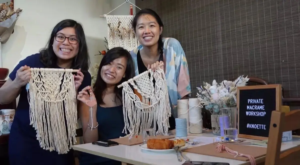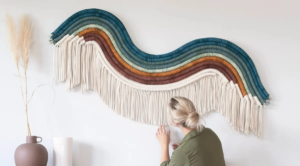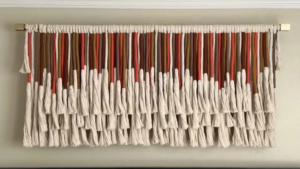In today’s environmentally conscious world, crafters and artisans are increasingly seeking sustainable alternatives that don’t compromise quality or creativity. Organic macrame cotton rope certified sustainable excellence represents a groundbreaking shift in the crafting industry, offering eco-warriors and creative enthusiasts an opportunity to pursue their passion while maintaining environmental responsibility. This comprehensive guide explores everything you need to know about choosing, using, and benefiting from certified organic cotton rope for your macrame projects.
The growing demand for sustainable crafting materials has revolutionized how we approach creative endeavors. Whether you’re a seasoned macrame artist or just beginning your fiber art journey, understanding the importance of organic macrame cotton rope certified sustainable excellence will transform your approach to conscious crafting. This article delves deep into the world of certified organic cotton rope, revealing why it’s becoming the gold standard for environmentally aware creators worldwide.
Understanding Organic Macrame Cotton Rope Certified Sustainable Standards
Organic macrame cotton rope certified sustainable excellence begins with understanding what makes cotton rope truly organic. Unlike conventional cotton rope, organic varieties are produced without synthetic pesticides, herbicides, or genetically modified organisms. The certification process ensures that every step of production, from seed to finished rope, meets stringent environmental and social standards established by recognized organic certification bodies.
The journey of organic macrame cotton rope certified sustainable excellence starts in carefully managed cotton fields where farmers employ regenerative agricultural practices. These methods not only protect soil health and water resources but also support biodiversity and wildlife habitats. When you choose organic macrame cotton rope certified sustainable options, you’re supporting farming communities that prioritize environmental stewardship over short-term profits.
Certification standards for organic macrame cotton rope extend beyond farming practices to encompass processing methods. Traditional cotton processing often involves harmful chemicals and bleaches that can leave residues in the final product. Certified organic rope manufacturers use eco-friendly processing techniques that eliminate toxic substances while maintaining the rope’s strength, durability, and natural beauty. This commitment to clean processing ensures that your organic macrame cotton rope certified sustainable choice remains safe for both creators and end-users.
Environmental Benefits of Choosing Organic Macrame Cotton Rope Certified Options
The environmental impact of choosing organic macrame cotton rope certified sustainable alternatives extends far beyond individual projects. Conventional cotton farming consumes approximately 16% of global insecticides and 7% of herbicides, despite occupying only 2.4% of cultivated land worldwide. By contrast, organic cotton cultivation eliminates these chemical inputs, reducing water pollution, soil degradation, and harm to beneficial insects and wildlife.
Organic macrame cotton rope certified sustainable production also addresses water conservation concerns. Conventional cotton farming requires enormous amounts of water, often depleting local water resources and contributing to drought conditions in farming regions. Organic farming practices emphasize water efficiency through improved soil health, crop rotation, and natural moisture retention techniques. Studies indicate that organic cotton farming can reduce water consumption by up to 91% compared to conventional methods.
Carbon sequestration represents another significant environmental benefit of organic macrame cotton rope certified sustainable choices. Organic farming practices naturally capture and store carbon in soil, helping mitigate climate change impacts. Research suggests that organic cotton fields can sequester approximately 1,800 pounds of carbon per acre annually, making your craft projects part of the climate solution rather than the problem.
The biodiversity preservation aspect of organic macrame cotton rope certified sustainable production cannot be overstated. Organic farms typically support 30% more species than conventional farms, providing crucial habitats for pollinators, birds, and beneficial insects. By choosing certified organic rope, crafters contribute to maintaining healthy ecosystems that support food security and environmental stability.
Quality Characteristics That Define Superior Organic Macrame Cotton Rope
Superior organic macrame cotton rope certified sustainable excellence exhibits specific quality characteristics that distinguish it from conventional alternatives. The fiber strength and durability of properly processed organic cotton often exceed conventional rope due to the absence of chemical treatments that can weaken natural fibers. This enhanced durability translates to longer-lasting macrame projects that maintain their beauty and structural integrity over time.
Texture and workability represent crucial factors in selecting organic macrame cotton rope certified sustainable options. High-quality organic rope maintains consistent thickness throughout its length, ensuring uniform knots and professional-looking finished projects. The natural processing methods preserve cotton’s inherent softness while maintaining sufficient structure for complex macrame patterns and designs.
Color retention and natural beauty distinguish premium organic macrame cotton rope certified sustainable products from inferior alternatives. Because organic processing avoids harsh bleaching and chemical treatments, the rope maintains cotton’s natural luster and accepts dyes more evenly. This results in vibrant, long-lasting colors that won’t fade or become patchy with age and use.
The absence of chemical residues in organic macrame cotton rope certified sustainable products makes them particularly suitable for items that come into contact with skin or food. Unlike conventionally processed rope that may contain traces of pesticides, bleaches, or synthetic finishes, certified organic rope provides peace of mind for creators making jewelry, baby items, or kitchen accessories.
Versatile Applications for Organic Macrame Cotton Rope Certified Projects
Home decoration represents one of the most popular applications for organic macrame cotton rope certified sustainable excellence. Wall hangings, plant holders, and room dividers created with certified organic rope not only beautify living spaces but also contribute to healthier indoor air quality. The natural properties of organic cotton help regulate humidity while avoiding off-gassing associated with synthetic materials.
Fashion and jewelry applications showcase the versatility of organic macrame cotton rope certified sustainable options. Designers increasingly turn to organic rope for creating statement necklaces, bracelets, belts, and bag straps that align with sustainable fashion principles. The hypoallergenic properties of organic cotton make these accessories suitable for individuals with sensitive skin or chemical sensitivities.
Garden and outdoor applications benefit significantly from organic macrame cotton rope certified sustainable characteristics. Plant hangers, garden trellises, and outdoor decorations made with organic rope naturally decompose at the end of their useful life, eliminating waste concerns. The UV resistance of properly processed organic cotton ensures that outdoor projects maintain their appearance and functionality through multiple seasons.
Baby and children’s items represent another important application category for organic macrame cotton rope certified sustainable products. Nursery decorations, toy storage solutions, and play equipment made with certified organic rope provide safe, non-toxic environments for developing children. Parents increasingly recognize the importance of minimizing chemical exposure during critical developmental stages, making organic materials essential choices.
Health and Safety Advantages of Organic Macrame Cotton Rope Certified Excellence
Chemical sensitivity concerns drive many crafters toward organic macrame cotton rope certified sustainable alternatives. Conventional rope processing often involves formaldehyde-based treatments, synthetic dyes, and finishing chemicals that can trigger allergic reactions or respiratory issues in sensitive individuals. Certified organic rope eliminates these concerns by maintaining strict standards for chemical-free processing throughout production.
Indoor air quality improvements represent an often-overlooked benefit of choosing organic macrame cotton rope certified sustainable options for home projects. Synthetic materials and chemically treated fibers can release volatile organic compounds (VOCs) into indoor air, contributing to sick building syndrome and respiratory problems. Organic cotton rope actually helps purify indoor air by naturally absorbing and neutralizing airborne pollutants.
The antimicrobial properties of organic cotton contribute to healthier crafting experiences and finished products. Unlike synthetic materials that can harbor bacteria and odors, organic macrame cotton rope certified sustainable options naturally resist microbial growth while remaining breathable and comfortable to work with. This characteristic makes organic rope particularly valuable for items that require frequent handling or extended wear.
Long-term health considerations favor organic macrame cotton rope certified sustainable choices for both creators and end-users. Emerging research suggests that prolonged exposure to chemical residues in conventional textiles may contribute to hormonal disruption and other health issues. By choosing certified organic materials, crafters can minimize these potential risks while enjoying their creative pursuits with greater confidence.
Economic Benefits of Investing in Organic Macrame Cotton Rope Certified Quality
Cost-effectiveness analysis reveals that organic macrame cotton rope certified sustainable excellence often provides superior value despite higher initial costs. The enhanced durability and longevity of organic rope means fewer replacement purchases and reduced project maintenance over time. Professional macrame artists report that organic rope maintains its appearance and structural integrity significantly longer than conventional alternatives.
Market demand trends strongly favor organic macrame cotton rope certified sustainable products, creating opportunities for crafters who create items for sale. Consumers increasingly seek out handmade goods that align with their environmental values, often paying premium prices for certified organic and sustainable products. This market preference translates to higher profit margins and increased sales potential for eco-conscious crafters.
Brand reputation benefits accrue to businesses and individual crafters who consistently choose organic macrame cotton rope certified sustainable materials. Environmental consciousness has become a significant factor in consumer purchasing decisions, with studies showing that 73% of millennials are willing to pay more for sustainable products. Building a reputation for environmental responsibility can differentiate your work in competitive markets.
The stability of organic material pricing provides economic advantages compared to synthetic alternatives subject to petroleum price fluctuations. While conventional rope prices vary dramatically with oil costs, organic macrame cotton rope certified sustainable options maintain more predictable pricing based on agricultural factors rather than volatile commodity markets.
Sourcing and Selecting Premium Organic Macrame Cotton Rope Certified Suppliers
Certification verification represents the foundation of selecting reliable organic macrame cotton rope certified sustainable suppliers. Legitimate suppliers readily provide documentation from recognized certification bodies such as GOTS (Global Organic Textile Standard), OEKO-TEX, or USDA Organic. These certifications ensure that products meet stringent standards for organic content, environmental criteria, and social standards throughout the supply chain.
Supply chain transparency distinguishes reputable organic macrame cotton rope certified sustainable suppliers from questionable alternatives. Quality suppliers provide detailed information about their cotton sources, processing facilities, and quality control measures. This transparency allows crafters to make informed decisions while supporting suppliers who share their environmental values.
Product consistency and quality control measures separate premium organic macrame cotton rope certified sustainable suppliers from budget alternatives. Established suppliers implement rigorous testing protocols to ensure consistent fiber quality, strength, and appearance across different production batches. This consistency proves crucial for professional crafters working on large projects or maintaining brand standards.
Customer support and technical expertise represent valuable aspects of working with specialized organic macrame cotton rope certified sustainable suppliers. Knowledgeable suppliers provide guidance on rope selection, care instructions, and project recommendations based on intended applications. This expertise proves particularly valuable for crafters transitioning from conventional to organic materials.
Care and Maintenance of Organic Macrame Cotton Rope Certified Projects
Proper cleaning techniques preserve the quality and appearance of organic macrame cotton rope certified sustainable projects while maintaining their environmental benefits. Unlike synthetic materials that require harsh chemicals for cleaning, organic cotton rope responds well to gentle, eco-friendly cleaning methods. Hand washing with mild, plant-based detergents maintains fiber integrity while removing dirt and stains effectively.
Storage considerations play a crucial role in maintaining organic macrame cotton rope certified sustainable quality over time. Proper storage in breathable containers away from direct sunlight and moisture prevents mold, mildew, and fiber degradation. Unlike synthetic materials that can tolerate various storage conditions, organic cotton requires careful attention to environmental factors for optimal longevity.
Preventive maintenance strategies extend the lifespan of organic macrame cotton rope certified sustainable projects significantly. Regular gentle brushing removes dust and prevents fiber matting, while periodic conditioning with natural oils maintains flexibility and appearance. These simple maintenance practices ensure that organic rope projects retain their beauty and functionality for years.
Repair techniques for organic macrame cotton rope certified sustainable projects often prove more effective than those used with synthetic materials. The natural fiber structure of organic cotton allows for seamless repairs using matching rope segments, making damage correction nearly invisible. This repairability adds to the long-term value and sustainability of choosing certified organic materials.
Future Trends in Organic Macrame Cotton Rope Certified Sustainable Innovation
Technological advancement continues to improve organic macrame cotton rope certified sustainable production methods while maintaining environmental standards. New processing techniques enhance fiber strength and consistency without compromising organic certification requirements. These innovations promise even better quality and performance in future organic rope products.
Market expansion trends indicate growing availability and variety of organic macrame cotton rope certified sustainable options. Increasing consumer demand drives suppliers to expand their organic product lines, offering crafters more choices in thickness, color, and specialized applications. This expansion makes organic rope accessible to broader audiences while maintaining quality standards.
Certification standard evolution reflects ongoing improvements in organic macrame cotton rope certified sustainable requirements. Certification bodies continually refine their standards to address emerging environmental concerns and social considerations. These evolving standards ensure that certified organic products continue meeting the highest sustainability criteria.
Integration with circular economy principles represents an emerging trend in organic macrame cotton rope certified sustainable development. Suppliers increasingly design products and packaging for complete recyclability or compostability, eliminating waste throughout the product lifecycle. This approach aligns perfectly with the environmental values driving organic material selection.

3 Pcs/Lot 100% Organic Cotton Yarn Best Yarn for Crochet
Embrace Nature’s Softness with 100% Organic Cotton Yarn: Your Go-To for Crochet and Knitting
Dive into the world of sustainable crafting with our 100% Organic Cotton Yarn, designed specifically for those who value environmental friendliness as much as they cherish quality in their handcrafted projects.
Frequently Asked Questions
What certifications should I look for when buying organic macrame cotton rope?
Look for GOTS (Global Organic Textile Standard), OEKO-TEX, or USDA Organic certifications when selecting organic macrame cotton rope certified sustainable options. These certifications ensure the rope meets strict environmental and social standards throughout production. GOTS certification specifically addresses textile processing and provides the most comprehensive coverage for organic cotton rope products.
How does organic macrame cotton rope compare in strength to conventional rope?
Organic macrame cotton rope certified sustainable excellence often exceeds conventional rope strength due to gentler processing methods that preserve natural fiber integrity. Chemical treatments used in conventional processing can actually weaken cotton fibers, while organic processing maintains and sometimes enhances natural strength characteristics. Many professional macrame artists report superior durability and longevity with certified organic rope.
Can organic macrame cotton rope be used for outdoor projects?
Yes, organic macrame cotton rope certified sustainable options work excellently for outdoor applications when properly selected and maintained. Choose rope with appropriate thickness and tight weave for outdoor exposure, and consider natural treatments that enhance weather resistance while maintaining organic certification. The biodegradable nature of organic cotton rope provides environmental benefits when outdoor projects reach end-of-life.
Is organic macrame cotton rope worth the higher cost?
The long-term value of organic macrame cotton rope certified sustainable excellence typically justifies higher initial costs through enhanced durability, health benefits, and environmental impact. Professional crafters often find that organic rope lasts significantly longer than conventional alternatives, reducing replacement costs over time. The growing market demand for sustainable products also provides economic advantages for crafters selling their work.
Conclusion
Organic macrame cotton rope certified sustainable excellence represents more than just a crafting material choice—it embodies a commitment to environmental stewardship, personal health, and creative integrity that resonates with today’s conscious consumers. Throughout this comprehensive exploration, we’ve discovered how certified organic rope delivers superior quality, environmental benefits, and long-term value that conventional alternatives simply cannot match.
The evidence overwhelmingly supports choosing organic macrame cotton rope certified sustainable options for both hobbyists and professional crafters seeking to align their creative pursuits with their values. From reduced environmental impact and enhanced durability to improved health outcomes and market advantages, certified organic rope delivers benefits that extend far beyond individual projects to create positive impacts for communities and ecosystems worldwide.









